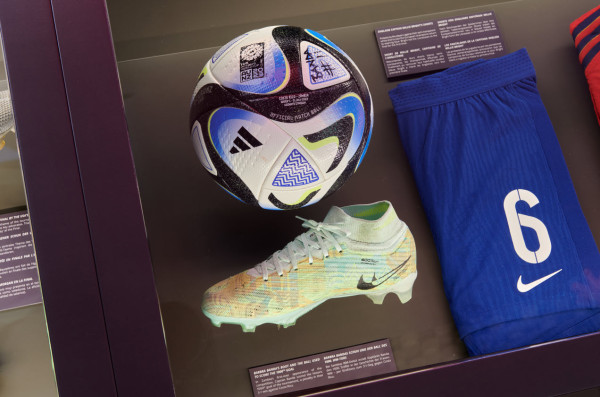From 12 December, the World Cup Gallery at the FIFA Museum in Zurich will feature an exciting addition: The showcase of the FIFA Women’s World Cup Australia&New Zealand 2023TM (www.FIFA.com), a celebration of women’s football that offers visitors a glimpse of some of the standout objects collected by the FIFA Museum during the recent tournament.
The FIFA Museum, the home of international football history, heritage, and culture, is proud to announce the acquisition of nearly 400 objects, collected at the FIFA Women’s World Cup 2023TM in Australia and New Zealand. Following these acquisitions, the museum now has one of the most significant international collections of women’s football objects in the world. Some of these new objects have been unveiled as part of the newly set up showcase to the public on 12 December.
The FIFA Museum has been actively collecting at the men’s and women’s World Cup tournaments since 2018, capturing football history as it is being made. The museum’s Exhibition and Heritage Team were responsible for bringing together boots, match balls, jerseys, tactical notes, and more from the FIFA Women’s World Cup 2023TM, identifying significant objects that would tell the story of this landmark tournament to future generations.
The tournament featured historic firsts and new milestones for the women’s game, as well as notable debuts and last matches from beloved teams and legendary players. It was the best attended and most viewed FIFA Women’s World CupTM in the tournament’s history, with just under 2 million fans attending the 64 games and approximately 2 billion viewers watching from home, cementing the FIFA Women’s World CupTM as a global cultural phenomenon. During the tournament, the FIFA Museum also presented a special exhibition, Calling the Shots: Faces of Women’s Football, at the FIFA Fan FestivalTM in Sydney/Gadigal, shining a light on the players, organisers, grassroots activists, coaches, and more that have made women’s football what it is today.
Upon seeing the new showcase for the first time FIFA Chief Women’s Football Officer Sarai Bareman said: “The FIFA Women’s World Cup 2023TM will for sure go down in history as the game changing moment that took women’s football to the next level. To see it immortalized in a showcase at the FIFA Museum, where fans can come and remember this landmark tournament is amazing. What a beautiful way to wrap up this year of women’s football.”
Objects exhibited in the new showcase:
Australia: Dhaal galk, or clapsticks, from the Kulin Nations people of south-central Victoria. They were used before kick-offs in Australia by First Nations peoples who welcomed fans and teams with Welcome to Country ceremonies.
England: Shorts worn by England captain Millie Bright, who led the Lionesses to the FIFA Women’s World CupTM final for the first time.
New Zealand: A poi (Māori for ball on a string), distributed at stadiums in Aotearoa to honour wāhine (women) and encourage fans to engage with Māori culture. Fans twirled them to support their teams.
Spain: Champion Jenni Hermoso’s match-issued shirt for the final against England.
Sweden: Penalty shoot-out analysis on goalkeeper Zećira Mušović’s water bottle, showing her plans for each opponent in the penalty shoot-out against the USA.
Zambia: Barbra Banda’s boots, worn as she scored the 1000th goal in the history of the FIFA Women’s World CupTM, a penalty against Costa Rica.
Other highlight objects collected at the FIFA Women’s World Cup 2023TM include:
Canada: The all-time leading goal scorer in international football, Christine Sinclair’s boots from the Canada-Australia match.
Colombia: One of football’s biggest talents, Linda Caicedo’s home shirt.
France: Jersey worn by French Captain Wendie Renard, during France-Jamaica match in which Jamaica won their first ever point at a FIFA Women’s World CupTM.
Germany: Shorts worn by Germany’s Captain, Alexandra Popp in which she scored two goals against Morocco.
Korea Republic: Boots worn by Casey Phair, who celebrated her 16th birthday only 26 days before the start of the FIFA Women’s World CupTM, making her the youngest player to ever partake in the tournament.
United States: Jersey prepared for Megan Rapinoe, who has since retired marking this tournament as her final FIFA Women’s World CupTM.
Referees: Yoshimi Yamashita’s headset, who made history as the first referee to announce a VAR decision live in the stadium, in the tournament’s opening match between New Zealand and Norway.
The FIFA Museum has an ongoing commitment to increasing the representation of women’s football within its collection and exhibitions. As part of this process, the museum will be redeveloping the World Cup Gallery in its permanent exhibition early next year. The World Cup Gallery houses the museum’s World Cup showcases, featuring a highlight selection of objects from each tournament, stretching back all the way to the inaugural men’s tournament in 1930. The redevelopment will expand the space, ensuring that the future FIFA Women’s World CupTM tournaments will have equal display space to the men’s, as the museum continues its active collecting, aspiring to raise the largest collection of women’s football related objects worldwide.
Distributed by APO Group on behalf of FIFA.
Contact for African media:
AfricanMedia@fifa.org
About the FIFA Museum:
The FIFA Museum is a landmark museum in Zurich with one of the most comprehensive collections of objects dedicated to international football. Celebrating the rich heritage of the beautiful game, the FIFA Museum tells the story of how world football’s governing body has developed association football globally and established it as the world’s undisputed number one sport. The FIFA Museum is committed to sharing the magic of football through a wide range of attractions, audiovisual experiences, and thought-provoking exhibitions.
To find out more, visit: www.FIFAMuseum.com

